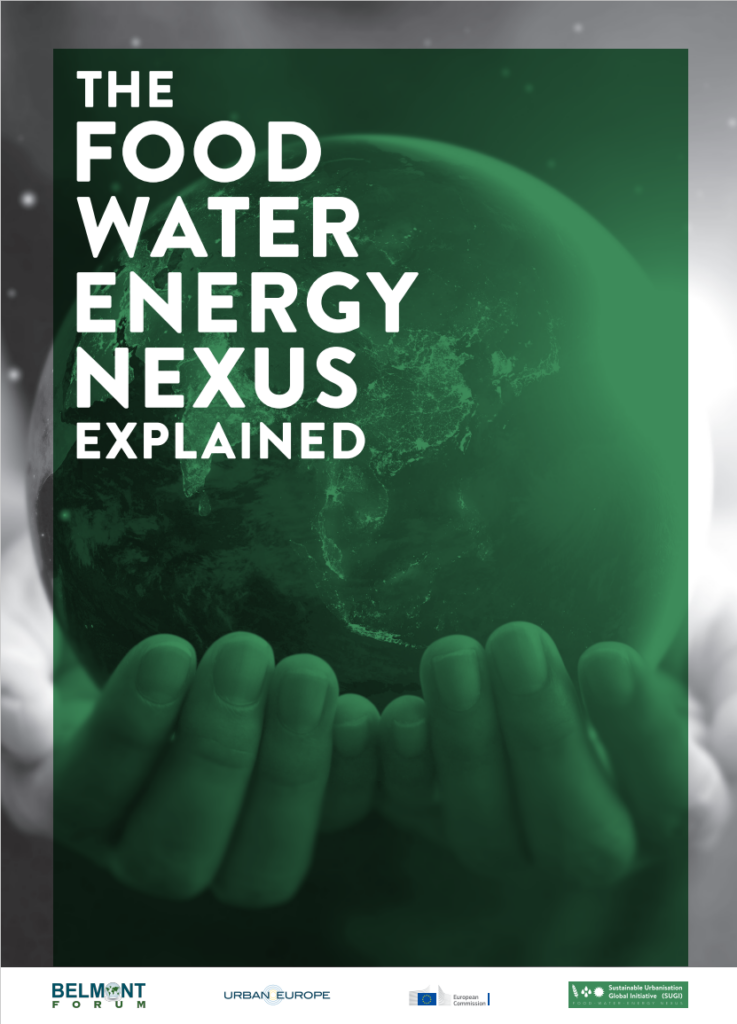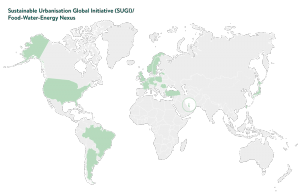Aim of the call
The interactions between food, water and energy are of paramount interest to policy, science and the society at large, today and even more so in the upcoming decades. Challenges connected with population increase and food shortages, scarce water and insufficient energy resources demand solutions.
The Sustainable Urbanisation Global Initiative (SUGI)/Food-Water-Energy Nexus is a joint call established in order to bring together actors to find innovative new solutions to the Food-Water-Energy Nexus challenge. The ultimate goal is to increase access and the quality of life. The overall challenge today is to move to action through dialogue: from a sector-oriented technocratic approach to one that recognises more diverse viewpoints and rationalities.
The call opened in December 2016 and closed in September 2017. The projects started during the first half of 2018 and ended in March 2022.
Call topics
Topic 1: Robust Knowledge, Indicators and Assessments
This theme focuses on the process of developing a relevant, accessible and global urban sustainability knowledge base for the FWE nexus framework. Ideally this knowledge base should help identify, assess and manage risks and uncertainties created by the process of urbanisation and aid in developing a rapid assessment process to scope and guide the development of knowledge platforms and user support tools. Development of this knowledge base requires efforts to gather, structure and synthesize existing knowledge, innovation practices, and potential systemic and applied solutions across the FWE nexus. This theme emphasizes the development of knowledge platforms, or tools that effectively connect researchers and stakeholders and provide clear conduits for knowledge to be used for decision-making and practical implementation. In addition to providing and discussing existing knowledge and experiences, these platforms should also serve as a hub for new research results emerging from projects addressing the themes 2 and 3.
Topic 2: Multi-level Governance and Management of the Food-Water-Energy Nexus
This theme focuses on strategies, technological and social innovations and solutions/implementations in the realm of governance and effective management of the FWE nexus. Urban systems require resilience strategies and climate adaptation concerning sustainable development, landscape, residential areas, economy, society and infrastructure, taking into account technological, engineered, ecological, spatial, economic and social innovations and solutions. The interlinkages of all urban infrastructures (energy supply, urban water supply and consumption, traffic, biological “green” resources, etc.) need to be observed as part of an efficient energy and materials-flow management.
Topic 3: Managing Potential Strategies and Solutions to address emerging Risk and Tradeoffs at the intersection of Sustainable Urbanisation and the Food-Water-Energy Nexus
This theme focuses on identifying and developing integrative strategies to assess and manage risks and uncertainties at the intersection of the sustainable urbanisation and the FWE nexus, while balancing tradeoffs and minimizing social and cultural inequalities. For example, both industrial and agricultural processes can optimize water use under different regulation and management strategies. This exacerbates competition, as well as fragmentation, and drives inequities between sectors. Projects in this theme could include identifying the specific drivers of social and economic inequalities arising from the process of urbanisation and developing tools for better stakeholder engagement, such as simulation systems and customizable capacity building interfaces
Timeline
Call opening 9 December 2016
Pre-proposal deadline 15 March 2017
Invitations to submit full proposal May 2017
Full proposal deadline: 20 September 2017
Funding decisions announced December 2017
Start of projects December 2017-March 2018
Projects end January 2021
Final event March 2022
Funded projects
The Sustainable Urbanisation Global Initiative (SUGI)/Food-Water-Energy Nexus projects started during the first half of 2018. A total of 88 proposals were successfully submitted in the first evaluation phase and from these a total of 40 proposals were invited for the full proposal stage. In November 2017 these proposals were assessed by an expert panel and 15 projects were selected for funding.
CITYFOOD – Smart integrated multitrophic city food production systems – a water and energy saving approach for global urbanization
Creating Interfaces – Building capacity for integrated governance at the food-water-energy-nexus in cities on the water
CRUNCH – Climate Resilient Urban Nexus CHoices: operationalising the Food-Water-Energy Nexus
ENLARGE – ENabling LARGE-scale integration of technology hubs to enhance community resiliency via DDS in various urban FWE nexuses
FEW-meter – The FEW-meter – an integrative model to measure and improve urban agriculture towards circular urban metabolism
FUSE – Food-water-energy for Urban Sustainable Environments
GLOCULL – Globally and LOCally-sustainable food-water-energy innovation in Urban Living Labs
IFWEN – Understanding Innovative Initiatives for Governing Food, Water and Energy Nexus in Cities
IN-SOURCE – INtegrated analysis and modelling for the management of sustainable urban FWE ReSOURCEs
METABOLIC – Intelligent Urban Metabolic Systems for Green Cities of Tomorrow: an FWE Nexus-based Approach
M-NEX – The Moveable NEXUS: Design-led urban food, water and energy management innovation in new boundary conditions of change
SUNEX – Formulating sustainable urban FWE strategy by optimizing the synergies between food, water and energy systems
Urbanising in Place – Building the food water energy nexus from below
Vertical Green 2.0 – Vertical greening for liveable cities – innovation to facilitate the breakthrough of an old concept
WASTE FEW ULL – Waste Food-Energy-Water Urban Living Lab – Mapping and Reducing Waste in the Food-Energy-Water Nexus
>> Complete list of projects including participating partners
>> Search for projects in other calls
Downloads

SUGI Project Results Catalogue 2022 (PDF)
SUGI Projects Catalogue 2018 (PDF)

The Food-Water-Energy Nexus explained (PDF)
SUGI/FWE Nexus Info flyer (PDF)
Report from the SUGI Midterm Valorisation Event (2020), and explore what SUGI projects have been awarded “Take it Further Grants”
Download the SUGI/FWE Nexus call text here
SUGI Special Edition Newsletter
Belmont Forum and JPI Urban Europe
The Belmont Forum is a group of the world’s major and emerging funders of global environmental change research. It aims to accelerate delivery of the environmental research needed to remove critical barriers to sustainability by aligning and mobilizing international resources. The Belmont Forum pursues the goals set in the Belmont Challenge by adding value to existing national investments and supporting international partnerships in interdisciplinary and transdisciplinary scientific endeavors.
Joint Programming Initiative Urban Europe was created in 2010 with the ambition to develop a European research and innovation hub on urban matters and create European solutions by means of coordinated research. The aim is to create attractive, sustainable and economically viable urban areas, in which European citizens, communities and their surroundings can thrive.
Call secretariat
If you have questions please contact the Call Secretariat:
Belmont Forum
Nicole Arbour, Belmont Fourm
E-mail: info@belmontforum.org
Judit Ungvári, Future Earth (US)
Telephone: +1 (917) 275 78 62
E-mail: judit.ungvari@futureearth.org
JPI Urban Europe
Johannes Bockstefl, FFG (AT)
Telephone: +43 5 77 55 50 42
E-mail: johannes.bockstefl@ffg.at
Daniela Melandri, Innovate UK UKRI (UK)
E-mail: daniela.melandri@innovateuk.ukri.org
James Taplin, Innovate UK UKRI (UK)
E-mail: James.Taplin@iuk.ukri.org
Funding agencies
SUGI FWE call Contact points participating FAs
5 Belmont Forum Agencies
| FAPESP (BR) | JST (JP) |
| QNRF (QA) | MOST (CY |
| NSF (UF) |
22 EU supported Funding Agencies
| MINCYT (AR) | NWO (NL) | Innovative UK (UK) |
| FFG (AT) | RCN (NO) | AHRC (UK) |
| FWO (BE) | NCN (PL) | TUBITAK (TR) |
| IRSIB (BE) | UEFISCDI (RO) | VIAA (LV) |
| RPF (CY) | Formas (SE) | ARRS (SI) |
| BMBF (DE) | SWEA (SE) | ANR (FR) |




